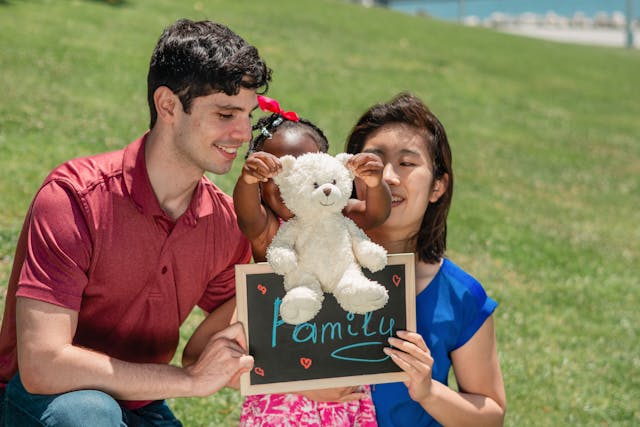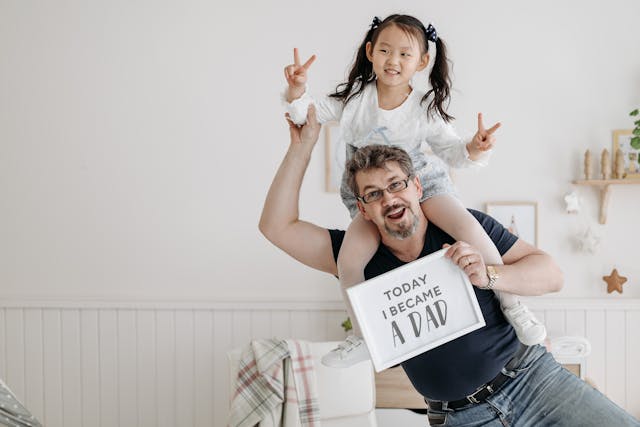Adopting a child is a life-changing experience, but it can also be emotionally difficult and complex, especially for first-time parents. Whether you’ve been dreaming of this moment for years or it’s a more recent decision, preparing emotionally for adoption helps you navigate the process and build a strong relationship as a couple.
Our Hearts Are Home
With open arms and love so deep, we welcome you, our dreams to keep.
A bond that’s made, not born in skin, our family starts where love begins.
This guide covers how to emotionally prepare as a couple for adopting a child, how to help each other through the challenges of first-time parenting, and how to manage the emotional ups and downs that come with your new role as parents.

Understanding the emotional challenges of adoption
The decision to adopt is often accompanied by a wide range of emotions, from excitement and joy to anxiety and uncertainty. As a couple, acknowledge that the adoption process can be emotionally intense. You may feel excited about welcoming a child, fearful about whether you’ll be good parents, uncertain about timelines and paperwork, or even grief-stricken if the decision to adopt followed infertility or other struggles.
These emotions are normal. Talk openly about your feelings and reassure each other that it’s okay to have doubts or fears. The more you communicate, the more prepared you’ll be to face this together.
Communicate Openly and Honestly
Strong communication is the foundation of any relationship, and it becomes even more important when you’re adopting a child. As you prepare for adoption, make it a priority to have open and honest conversations with each other. Discuss your hopes, fears, and expectations for the adoption process, as well as your parenting styles and how you envision life as a family.
Here are some topics to discuss:
- Why you want to adopt: Are both of you equally committed to the decision? What motivates you to become adoptive parents?
- Concerns about the process: Are there any worries about the paperwork, wait times, or home studies?
- Parenting expectations: What kind of parents do you each want to be? How will you divide parenting responsibilities?
- Emotional support: How can you support each other through the more difficult moments?
The more you talk about these things, the more you’ll understand each other’s perspectives, which will help you provide emotional support during the adoption process.
Educate Yourselves About Adoption
One of the best ways to emotionally prepare for adoption is to educate yourselves about what to expect. The more you know about the adoption process, the more confident and prepared you’ll feel. Attend adoption seminars, read books, and talk to other adoptive parents to gain insights into the challenges and joys that come with adoption.
Some topics to explore include:
- Types of adoption: Whether it’s domestic, international, or foster care adoption, each type has its own process and emotional dynamics.
- Attachment and bonding: Understand how the child may take time to form emotional connections with you, especially if they’ve experienced trauma or multiple caregivers in the past.
- Grief and loss: Both you and your adopted child may experience feelings of grief, whether it’s from infertility, the loss of a birth family, or the adjustment to a new life.
- Adoptive parenting tips: Learn about parenting strategies that support the needs of adopted children, such as maintaining openness about the adoption story or handling questions from the child.
By educating yourselves, you’ll gain a clearer understanding of what to expect, which will help you both prepare for what’s ahead.
 |  |
|---|
Attend Counseling or Support Groups
Adoption is a major life transition, and it’s important to seek professional support when needed. Attending pre-adoption counseling as a couple can help you explore your emotions in a safe and supportive environment. A counselor can guide you through difficult feelings, help you manage any anxieties, and strengthen your bond as a couple.
Joining adoption support groups can also be very helpful. Connecting with other adoptive parents gives you access to practical advice and emotional reassurance. Hearing about others’ experiences can help you feel less alone and more prepared for the ups and downs of the process.
Be Patient with Yourselves and Each Other
Adoption can be a long and sometimes stressful process. It’s important to be patient with yourselves and with each other during this time. There may be moments when you feel frustrated, anxious, or emotionally drained, but remember that these feelings are normal. Instead of putting pressure on yourselves to feel a certain way, allow room for each of you to experience the full range of emotions that come with adoption.
Patience is especially important once the child arrives. Bonding with an adopted child may take time, and it’s important to give yourselves and the child the space to build trust and emotional connections at a pace that feels natural.
Discuss Parenting Styles and Roles
Before your child arrives, have conversations about how you’ll parent together. It’s important to understand each other’s parenting styles and expectations. For example, one partner may be more strict, while the other may prefer a more laid-back approach. Discuss how you’ll handle discipline, bedtime routines, education, and other parts of raising a child.
Talk about how you’ll share parenting responsibilities too. Will both of you work outside the home, or will one parent stay home? How will you divide daily tasks like feeding, diaper changes, and playtime? By discussing these roles in advance, you can avoid misunderstandings and create a partnership that supports both parents equally. Balancing work and family life can be challenging, especially for new parents.
Prepare for Attachment and Bonding Challenges
Bonding with an adopted child may not always happen instantly. Depending on the child’s background and previous experiences, they may take time to trust and connect with their new parents. It’s important to be emotionally prepared for this and not to take it personally if bonding doesn’t happen right away.
As a couple, you can support each other by remaining patient and understanding. Talk openly about how you’re feeling and remind each other that forming strong attachments takes time. You may also want to seek guidance from a therapist who specializes in adoption to help navigate any attachment challenges.
 |  |
|---|---|
 |
Create a Supportive Environment
Adopting a child is a big transition for both you and your new family member. It’s important to create a supportive and nurturing environment that promotes emotional well-being for everyone. Here are some ways to do that:
- Establish routines: Routines can help your child feel safe and secure in their new environment. Simple daily routines like mealtimes, bedtime, and playtime give a sense of stability.
- Celebrate small victories: Whether it’s your child’s first smile or their first night sleeping through the night, celebrate these moments together. They’ll help strengthen your bond as a couple and family.
- Create a safe space for emotions: Encourage open communication within the family. Let your child know that it’s okay to express their feelings, and support each other as a couple when emotions run high.
Stay Connected as a Couple
Adopting a child is a life-changing experience, but it’s important to stay connected as a couple throughout the process. Make time for each other, even if it’s just a few minutes each day to talk or enjoy a cup of coffee together. Strong emotional support from your partner will help you both manage the challenges of adoption and parenting.
Consider scheduling regular date nights or simple activities that allow you to relax and reconnect. Remember, taking care of your relationship will also benefit your child, as a strong and supportive partnership creates a stable and loving home environment.
Embrace Flexibility
Finally, it’s important to remain flexible throughout the adoption process and as you adjust to life as parents. Things may not always go according to plan, and that’s okay. What matters most is staying adaptable and supporting each other when unexpected challenges arise. Whether it’s a delay in the adoption process or difficulties adjusting to parenthood, remember that you’re in this together.
Embracing flexibility will help you navigate the emotional ups and downs with more ease, and it will also teach your child that change and uncertainty are a natural part of life.

Conclusion
Adopting a child as first-time parents is both rewarding and emotional. Preparing as a couple, communicating openly, educating yourselves, and supporting each other through the process all help build a strong foundation for your family. Be patient, seek help when needed, and stay connected as a couple. With love, understanding, and teamwork, you’ll be ready to face whatever comes with parenting through adoption.